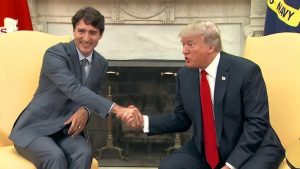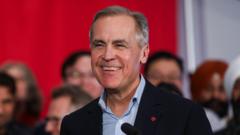In a significant diplomatic move, two of Canada's senior ministers are in Palm Beach to negotiate with the Trump administration regarding border security and potential trade tariffs on Canadian goods.
Canada's Ministers Meet Trump Administration in Palm Beach to Discuss Border Security and Trade

Canada's Ministers Meet Trump Administration in Palm Beach to Discuss Border Security and Trade
Critical discussions address trade tensions, tariffs, and border security issues between Canada and the U.S.
Canada's Finance Minister Dominic LeBlanc and Foreign Minister Mélanie Joly are currently in Palm Beach, Florida, for high-stakes discussions with the incoming Trump administration, focused on vital issues surrounding border security and trade relations. Their meeting with Tom Homan, designated by Trump as the "border czar," seeks to address rising concerns over drug trafficking and illegal migration while also countering threats of a 25% tariff on Canadian exports.
LeBlanc's spokesperson, Jean-Sébastien Comeau, emphasized the intention to build upon prior negotiations between Prime Minister Justin Trudeau and Donald Trump held at Mar-a-Lago. "The ministers will underscore Canada’s initiatives against fentanyl trafficking and illegal migration as part of our Border Plan, while warning of the detrimental effects that extensive tariffs on Canadian goods could inflict on both nations," Comeau asserted.
The urgency of these discussions arises from the considerable investment Canada has made in border security initiatives, amounting to billions, to address U.S. apprehensions regarding drug smuggling and migration flows. While the fentanyl seizure statistics illustrate a marked contrast with the Mexican border—43 pounds seized in Canada compared to over 21,000 pounds at the southern border—Trump has branded Canada's efforts as lacking ambition. He has previously characterized Canada’s Prime Minister as “the governor of the 51st state,” trivializing Canada’s sovereignty as a trading partner.
The trade landscape has grown increasingly contentious, with Trump frequently criticizing the so-called trade deficit with Canada, though data refutes such assertions. Canada’s ambassador to the U.S., Kirsten Hillman, highlighted that a substantial portion of U.S. imports from Canada comprises energy, with Canada supplying 60% of U.S. crude oil and 85% of electricity imports. Each day, nearly $3.6 billion worth of trade crosses the border, solidifying Canada as the leading export market for 36 U.S. states.
On the front of migration, stark contrasts between the two borders persist, with U.S. Border Patrol reporting 1.53 million migrant encounters at the Mexican border in the past fiscal year, versus only 23,721 at the Canadian border. Nevertheless, LeBlanc and Joly’s agenda will aim to reaffirm Canada’s commitment to addressing U.S. dilemmas through their structured Border Plan, targeting both illegal migration and fentanyl trafficking.
Expressing cautious optimism before the critical talks, LeBlanc acknowledged the hurdles ahead. "We have shared elements of our plan with American counterparts and feel progress is being made, but a considerable amount of effort still lies ahead," he remarked last week. The ministers' engagement in Palm Beach serves as a pivotal opportunity for Canada to navigate the complexities of its relationship with the incoming Trump administration while striving for a balanced resolution that considers mutual interests.
With trade, migration, and security poised prominently on the agenda, the outcomes of these discussions could dramatically influence the trajectory of U.S.-Canada relations amid escalating economic and geopolitical challenges.























